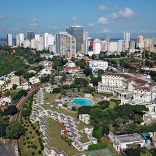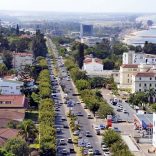Mozambique: Public sector wage expenditure rises 0.2% to €1,424 million in H1
Mozambique ‘High expectations’ for Port of Mocímboa da Praia as TotalEnergies’ resumption nears

File photo: Lusa
The return of TotalEnergies’ gas megaproject in Cabo Delgado, scheduled for this year, has raised optimism in the projections for the Port of Mocímboa da Praia, a “strategic infrastructure” occupied by rebels in 2020 and rehabilitated in 2023.
“Basically, megaprojects are our pillars. […] There are high expectations for the return of gas projects in the region,” said Helénio Turzão, administrator of the Port of Mocímboa da Praia, in an interview with Lusa.
On the night of August 12, 2020, armed groups that had been carrying out attacks in Cabo Delgado since 2017 invaded the Port of Mocímboa da Praia and the clashes with the Defense and Security Forces left an unknown number of dead, including members of the maritime force.
Rehabilitation of the infrastructure included the construction of a new pier and the restoration of the container park, a total investment of more than US$13.5 million (€12 million).
“The cargo handling we are doing now is far from the capacity we installed in the port, but we clearly understand that this capacity will quickly be challenged, as soon as the gas projects resume and economic activity returns to full capacity. Today, this capacity is practically 90% idle,” Helénio Turzão noted.
The optimism of the Mocímboa da Praia Port administration comes at a time when the French multinational TotalEnergies expects to resume the liquefied natural gas (LNG) megaproject in Cabo Delgado, northern Mozambique, this year, with financing needs practically assured and the security situation in the area guaranteed.
Overall, the project, valued at US$20 billion (€17.6 billion), has been suspended since 2021, when the force majeure clause was invoked due to attacks attributed to terrorist groups in Cabo Delgado.
TotalEnergies, leader of the Area 1 consortium, is currently developing the construction of a power plant in Afungi, near Palma, just over 70 kilometres from Mocímboa da Praia.
Despite the optimism, Helénio Turzão continued, some caution is needed, since the load associated with the gas projects is short-term.
“We are aware of the deadline. These are not medium-term cargoes and, in fact, what guarantees the sustainability of any port is the long-term cargo. This will always be the cargo resulting from local initiative. This is the reason for our commitment to promoting cabotage, right from the time of rehabilitation,” he added.
In 2024, the first year after rehabilitation, the Port of Mocímboa da Praia handled 15,000 tons of diverse cargo and 10 million litres of fuel.
“In 2025, by the end of the first quarter, we had handled around 4,000 tons of products and around five million litres of fuel. […] This year, we will easily surpass the 2024 figures,” Turzão claimed.
When government forces recovered Mocímboa da Praia in 2021, the port was completely devastated, as was the cargo of several clients caught in transit there.
“From a security perspective, we have not had any incidents since the recapture. There have been news and reports of incidents in nearby areas, but not in the Mocímboa da Praia area of influence,” he added.
READ: Rebuilding Mocimboa da Praia port will cost 30 million dollars
Cabo Delgado governor and TotalEnergies country manager visit Mocímboa da Praia port – Photos
Mozambique: Port of Mocímboa da Praia reopens, two months on
During its months in the hands of the rebels, Mocímboa da Praia was looted and almost all public and private infrastructure was destroyed, as well as the energy, water, communications and hospital systems.
In total, around 62,000 people, almost the entire population, abandoned the coastal town due to the conflict that began five and a half years ago, with the mass exodus intensifying after rebel action in June, 2020.
The recovery of Mocímboa da Praia was the result of joint operations by Mozambican, Rwandan and the Southern African Development Community (SADC) forces, the latter of which has now left the country.
The coastal town, located 70 kilometres south of the TotalEnergies-led natural gas exploration project in Afungi, Palma, was where armed groups carried out their first attack in October, 2017, and was long described as the rebels’ “base”.













Leave a Reply
Be the First to Comment!
You must be logged in to post a comment.
You must be logged in to post a comment.